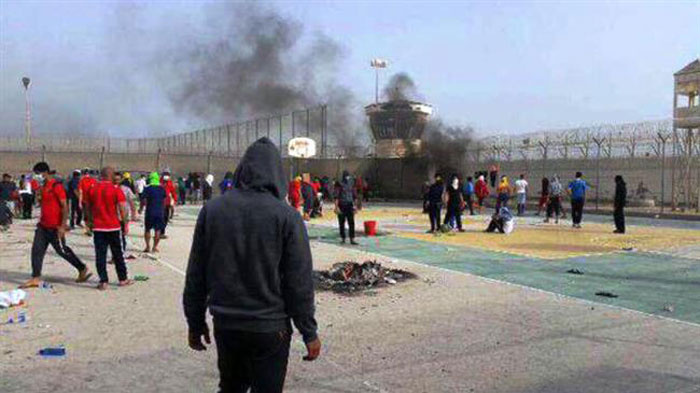Bahrain’s Prison Crisis Deepens

In December 2013 Human Rights First predicted trouble in Bahrain's prisons. "Overcrowding is a recipe for destabilization that could spread beyond the prison's walls," we said. Sure enough, four months later, there was a riot in Bahrain's main prison, Jaw.
The authorities reported, "A team of investigators and a coroner attended [the prison] ... to interrogate 236 inmates" after dozens of prisoners were teargassed and batoned. Then last month an even more serious disturbance occurred, again in Jaw. Reports of what really happened on March 10 and since then are trickling out slowly, and concrete information is difficult to confirm, as families say that visits and phone calls have been restricted or stopped.
The family of Dr. Ali Alekri tweeted on April 7, "Last visit to Dr Ali AlEkri was on March 4 .. Still #JawPrison not allowing visits. Phone calls only once a week lasting 5 min #Bahrain." Ali Alekri is a consultant pediatric orthopedic surgeon, one of the Bahrain medics tortured and sentenced in 2011 after treating injured protestors during the large-scale demonstrations for democracy. He is serving a five-year sentence in Jaw.
The family of former Bahraini policeman Ali al Ghanmi say they have not been allowed to see him since before the riot and are worried about his safety. Al Ghanmi joined the widespread protests for democracy in 2011 and was sentenced to 12 years in jail after an unfair trial.
"He called last week but wasn't allowed to speak freely. You can tell from his way of talking," a family member told Human Rights First.
Reports from local human rights activists suggest that many of the prisoners are now sleeping in tents outside the main prison blocks, and that since March 10 some prisoners have been taken to Building 10 and mistreated. Human rights defender Abdulhadi Al Khawaja is a prisoner in Jaw, serving a life sentence for his peaceful part in the 2011 protests. On April 3 his daughter Maryam tweeted that her father had made a short phone call to his family and "said he can hear screams of #torture in bldg 10."
Leading human rights defender Nabeel Rajab was arrested on April 2 for reporting information about the prison. The U.S. government has rightly called for the charges against Rajab to be dropped and for his release.
It will take a while before the truth emerges about what's happened in Jaw over the last month, but there's no doubt it will. The latest unrest seems to have been triggered by a dispute involving a female relative trying to visit a prisoner on March 10. The authorities report damage to prison property "as a result of riotous activity."
This is unlikely to be the last clash in Bahrain's prison system. As Human Rights First noted in 2013, "Many of the problems in Jaw stem from the growing population of prisoners who shouldn't be there -- political prisoners jailed for expressing their views peacefully." That's still the case.
Added to that powerful sense of injustice are several other ingredients guaranteed to provoke unrest in jails: hundreds of young men serving very long sentences, a lack of adequate medical care, poor food, and chronic overcrowding (that last point conceded by the government in a September 2013 report that noted that, at that time, Jaw Prison held 1,608 prisoners, well beyond its capacity of 1,201).
Many younger prisoners may feel they have nothing to lose by refusing to cooperate with the prison authorities and are likely to riot again and again. If Bahrain wants to fix its prison problem properly, it will stop trying to hide the truth about what's happened, improve conditions, and release all those prisoners who shouldn't be in jail in the first place.
Source: Huffington Post

